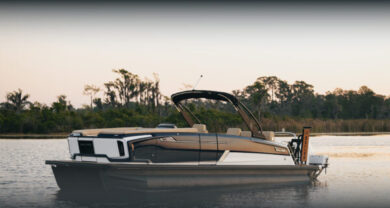NMMA battles boat bans
As you read this, legislation that seeks to ban certain boats from three lakes in eastern Alabama is just weeks from taking effect.
And while the direct impact of the ban may be limited to this small region, other boating communities across the nation should be on the lookout for similar proposals.
The legislation prohibits boats longer than 30 feet, six inches – or boats longer than 26 feet, 11 inches rated for speeds in excess of 60 miles per hour – from the lakes. Restrictive as those bans are, however, they are actually more limited in scope than their proponents originally intended. In addition to keeping boats off of Lake Harris, Lake Martin and Weiss Lake, Alabama legislators had sought to ban boats from eight other lakes in the state as well.
The Alabama ban, which was signed into law by Gov. Bob Riley in late April, and which the National Marine Manufacturers Association has called “Draconian,” is nearly identical to a measure banning boats from six Georgia lakes that was signed into law at almost exactly the same time.
While it’s not unusual for state or local governments around the country to restrict boating on certain bodies of water from time to time, officials with the NMMA say these bans were unique – for reasons that really have nothing to do with boating.
“This is the first time we’ve seen a corporation decide how to deal with public waters, and that was a little bit disconcerting,” says Monita Fontaine, NMMA’s vice president of government relations.
The corporation to which Fontaine is referring is the Southern Co., which owns both the Alabama Power Co. and the Georgia Power Co., regional utilities that use some of the lakes in question for hydroelectric power generation.
The Southern Co. also owns waterfront property along some of those same lakes, and critics of the boat ban legislation contend that its passage will pave the way for future development and mollify residents already living on the lakes who don’t like the traffic, noise or appearance they blame on certain kinds of boats.
“This is the first time we’ve had a two-state region with an overarching company premeditate an attempt to restrict boating across a number of lakes for the purpose of providing sort of exclusive pleasure for the wealthy waterfront leaseholders,” Fontaine says. “It certainly smacks of good ole boy – them that’s got it call the shots.”
Spokespeople for the Southern Co. have said it supports the restrictions, but does so because it wants to protect the lakes from overcrowding and preserve the quality of life on them.
Fallout
Whatever their origins, the new restrictions are sure to have an impact on marine businesses in the two states. In Alabama alone, there are 9,000 registered boaters with boats over 30 feet in length who will no longer have access to the waters of those three lakes. Some boat dealers in the two states have already expressed fears that the bans will hurt sales.
Others fear that once laws of this kind are passed, it becomes easier for them to gain traction elsewhere.
“It’s a bad precedent, I can’t deny that,” Fontaine says. “Will there be more attempts? You betcha. We have more people. We have more boats, and people like restricting other people’s access. So yes, I think it’s inevitable.”
That certainty is one reason NMMA pays for a system that monitors all 50 state legislatures for just those kinds of proposals, and retains contract lobbyists year-round in the top-10 boating states.
Fontaine says oftentimes restrictions or bans are the result of an accident or another single event that acts as a catalyst for change. In other instances, restrictions come into place as the result of a need; a body of water that’s too shallow or narrow for certain kinds of boats, for example.
In those cases, NMMA tries to help mediate and work for a solution that satisfies all of those concerned.
However, Fontaine says that in this case, news of the Alabama ban sprung up quickly and proponents had a lot of money behind them.
“They had it dropped and voted on, out of one house, within a week,” Fontaine says. “Each member of the [Alabama] Senate that voted on this received $5,000.”
NMMA retained local lobbyists, ramped up its grassroots network and even sent its own people to lobby state legislators. Those efforts didn’t pay off. But Fontaine says NMMA will be ever more vigilant in the future. And she believes the bans could still be reversed with time.
“Nine thousand already known, registered boats over the 30-feet listing will no longer have access to those rather large bodies of water,” she says. “Who knows when people will wake up to that fact.”




